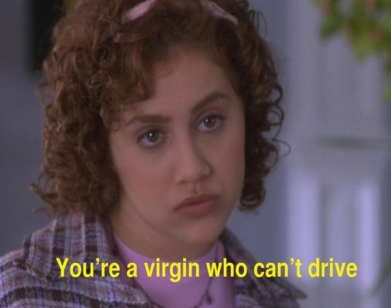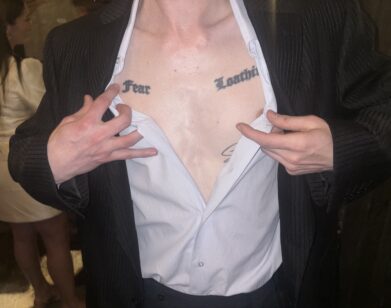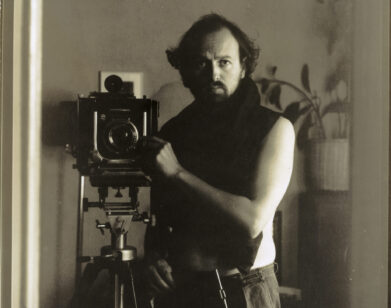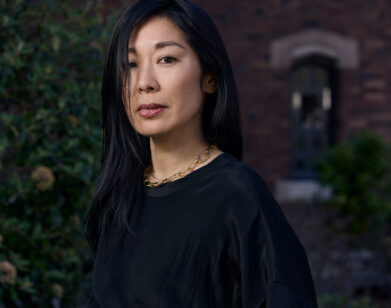ROUGH DRAFT
Inside Marlowe Granados’ Glitzy Debut Novel, Happy Hour

This is Rough Draft, in which our favorite writers get to the bottom of their own craft. From preferred writing drinks to whether or not you really need to carry a notebook, we find out all the ways they beat writer’s block and get it done.
The past few years have been filled with firsts for Marlowe Granados. In 2019, the writer, filmmaker, and podcaster launched The Mean Reds, a podcast that she co-hosts alongside Ivana Lovric, where the pair dig deep into a slew of women-led films such as Jennifer’s Body, Legally Blonde, and When Harry Met Sally. In the same year, Granados debuted her short film The Leaving Party, which follows the conversations among a group of friends over the course of one summer day. Today, she releases her debut novel, Happy Hour: a glitzy coming-of-age saga about two friends navigating the singular experience of getting by in New York City. The story follows Isa and Gala, two twenty-something newcomers to the city. By day, the pair sell clothes and scrape by on bodega lunches in their tumbledown Bed-Stuy sublet. By night, they run the streets of the Upper East Side, partying with celebrities, aristocrats, and all manner of eclectic characters. As they attempt to translate wild nights out into sustainable Uptown social capital, the girls are forced to reckon with the fault lines in their relationship. Below, Granados reflects on her “exorcism”-like writing process, reads us some lines from her notebook, and explains why she always returns to the work of Frank O’Hara.
———
JULIANA UKIOMOGBE: Describe your ideal writing atmosphere. What gets you in the mood?
MARLOWE GRANADOS: I like chatter and movement. I like to listen to people talking in the background. I don’t love writing at home. My bed is too close by and I’m prone to lying down in the afternoons once the caffeine starts to dip—that 3 PM lull. I’ll write in cafes or libraries. When I used to travel a lot, I’d write on planes. I’m a social creature and I like to write out in the world.
UKIOMOGBE: What are your go-to writing snacks?
GRANADOS: I have a coffee with cream in the morning and I just wait until I’m famished and get a late lunch once I can’t write anything anymore. It’s terrible!
UKIOMOGBE: Do you keep a notebook or journal?
GRANADOS: I have little notebooks all over my apartment. One for lists, one for planning essays, one for fiction. When I’m on the go, I jot things in my phone. If I don’t write something down, it’ll be forgotten forever! When I was a hostess in London, I used to jot down a turn of phrase here and there on the backs of old menus. I still have them around somewhere. I kept them for posterity!
UKIOMOGBE: Give us a peek inside. Can you read something off of a random page?
GRANADOS: “Anytime you leave a woman waiting she begins to have doubts.”
UKIOMOGBE: Do you prefer handwriting or typing?
GRANADOS: I write quite a lot down on paper. I remember being on the plane from London to Houston and writing out ideas for diary entries that would eventually appear in Happy Hour—just furiously writing on this red-eye flight. I write in cursive, and sometimes when I get too frenzied I can barely make out what it says.
UKIOMOGBE: What’s your favorite quote?
GRANADOS: “Each time my heart is broken it makes me feel more adventurous (and how the same names keep recurring on that interminable list!).” I return to Frank O’Hara’s poems to remind myself to always be warm and open, in life and in writing. His work has that rare quality to make you feel a renewed curiosity about the world and plunge yourself into it.
UKIOMOGBE: Who’s on your writing playlist?
GRANADOS: I don’t listen to music when writing, but if I did, it would be bossa nova.
UKIOMOGBE: What’s your favorite book to reread?
GRANADOS: Gentlemen Prefer Blondes by Anita Loos. It had a huge influence on me. My copy is vile, all crumpled and annotated. I like to look through all the Eloise at the Plaza books by Kay Thompson. I think if you look at the way the voice is shaped, it’s such a lesson on how to create a character’s “dialect.” It feels so obviously connected to the way I stylized my characters and their way of speaking. Mr. Right is Dead by Rona Jaffe is incredibly chic prose. This short story by Djuna Barnes called “The Woman Who Goes Abroad to Forget.”
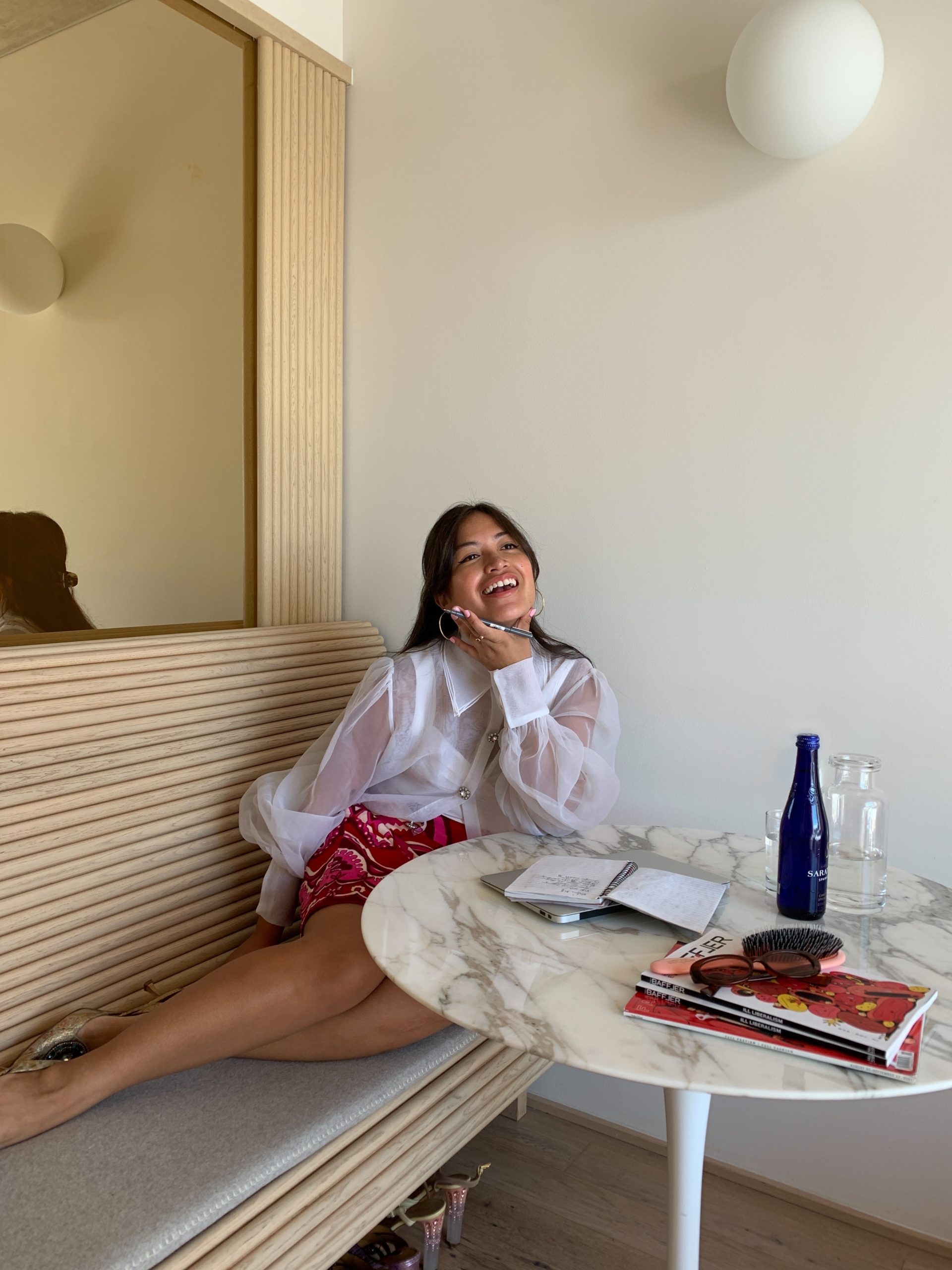
UKIOMOGBE: Which writers inform your current work the most?
GRANADOS: At the moment, Rona Jaffe. As a culture, we’re so terrible at handling humorous writing from women and we let them be forgotten. I just won’t stand for it.
UKIOMOGBE: How many drafts of one piece do you typically write?
GRANADOS: Essays usually get two, fiction is just small tweaks over and over again in places where I’m being lazy (which is often)!
UKIOMOGBE: Who’s your favorite screenwriter?
GRANADOS: Anita Loos, Charles Lederer, and Whit Stillman (for The Last Days of Disco and Metropolitan).
UKIOMOGBE: Do you consider writing to be a spiritual practice?
GRANADOS: It’s more on par with an exorcism.
UKIOMGBE: Which writers would you choose to have dinner with, living or dead?
GRANADOS: It depends on if they’ll be picking up the check.
UKIOMOGBE: What advice do you have for people who want to be better writers?
GRANADOS: I think you should really live, but in all directions. “Live!” like Rosalind Russell in Auntie Mame. I talk to everyone all the time. I think it’s important to not just stay in a certain milieu or social scene otherwise your work will feel so insular. Commune with all kinds of people!
UKIOMOGBE: What are some unconventional techniques you stand by?
GRANADOS: Pacing manically up and down my apartment in the middle of a sentence.
UKIOMOGBE: Can great writing save the world?
GRANADOS: It hasn’t already, and it won’t start now. Organizing and caring for your community is the only way out!

